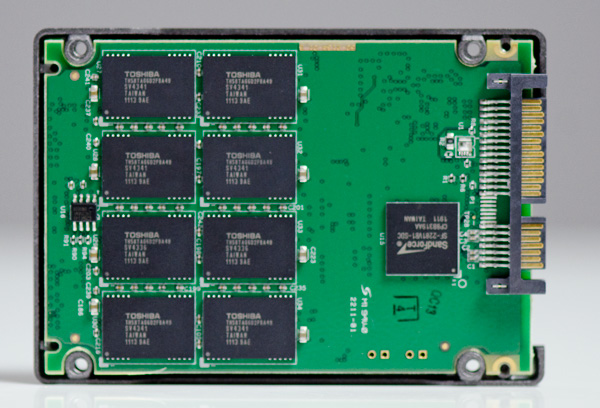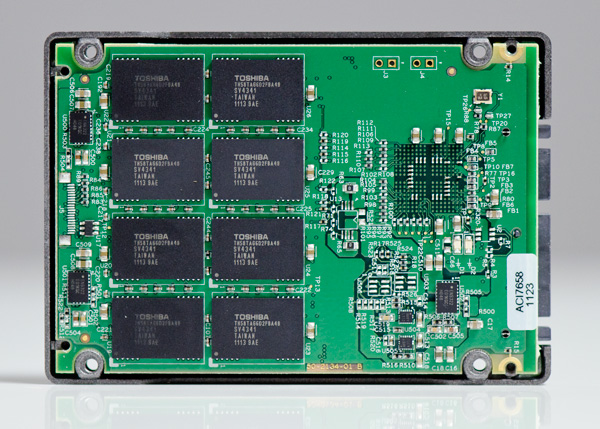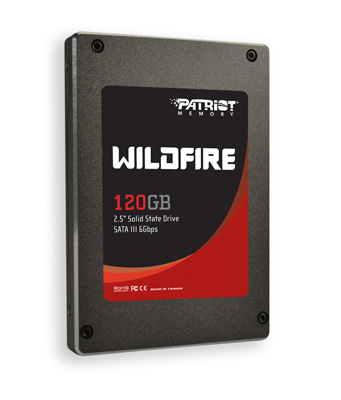OCZ Vertex 3 MAX IOPS & Patriot Wildfire SSDs Reviewed
by Anand Lal Shimpi on June 23, 2011 4:35 AM ESTPatriot's Wildfire
OCZ isn't the only company experimenting with SF-2281 drives and 32nm NAND. Patriot sent me the Wildfire, its first SF-2281 SSD. After a quick run through some performance tests I grew suspicious as it performed a lot like the Vertex 3 MAX IOPS I just tested. Cracking open the case I found the reason:
The Wildfire also uses 32nm Toshiba NAND. The 120GB drive Patriot sent has a 16 chip, 2 die per package configuration - compared to 8 chips with 4 die per package in the Vertex 3 MI. I don't see an advantage for one approach vs. the other. Patriot is targeting a $299 MSRP for the Wildfire, which would put it lower than the Vertex 3 MAX IOPS - although anything is possible once the drive goes on sale on the 28th of this month.

Patriot confirmed that the Wildfire would only use 32nm Toshiba NAND and that any NAND vendor changes would take place in other lines or subsets of the Wildfire brand.
Patriot uses a different PCB layout from OCZ. I don't know that there's an advantage to either layout, they are just different.
The unit I have here shipped with SF firmware revision 3.19, which is equivalent to OCZ's revision 2.08 firmware as far as I know. No word on when we'll see a 2.09 equivalent.
Performance of the Wildfire (as you'll see from the tests that follow) is identical to the Vertex 3 MAX IOPS. To keep the charts more manageable I've only included 6Gbps results from the Wildfire in most areas. Performance on a 3Gbps interface is identical to a 3Gbps Vertex 3 MAX IOPS as you'd expect.
The Test
| CPU | Intel Core i7 965 running at 3.2GHz (Turbo & EIST Disabled) Intel Core i7 2600K running at 3.4GHz (Turbo & EIST Disabled) - for AT SB 2011, AS SSD & ATTO |
| Motherboard: | Intel DX58SO (Intel X58) Intel H67 Motherboard |
| Chipset: | Intel X58 + Marvell SATA 6Gbps PCIe Intel H67 |
| Chipset Drivers: | Intel 9.1.1.1015 + Intel IMSM 8.9 Intel 9.1.1.1015 + Intel RST 10.2 |
| Memory: | Qimonda DDR3-1333 4 x 1GB (7-7-7-20) |
| Video Card: | eVGA GeForce GTX 285 |
| Video Drivers: | NVIDIA ForceWare 190.38 64-bit |
| Desktop Resolution: | 1920 x 1200 |
| OS: | Windows 7 x64 |












112 Comments
View All Comments
poohbear - Thursday, June 23, 2011 - link
Thank you for being upfront at the very beginning about "the elephant in the room"! some sites were blamed for ignoring the issue, but u guys were spot on about it and to be honest its one of the main reason i've been steering clear of any Sandforce 2000 based SSDs. two thirds of a percent? why give it in such a complicated way???? two thirds of a percent is .6% of all drives? why not just say 1% of all drives, but yea i understand disgruntled consumers are often the most vocal about a problem.Nice review though, might look into this when they have some new and more mature firmwares. Right now im fine with my Crucial C300 64gb.^^
bivoy - Thursday, June 23, 2011 - link
strange, my A DATA SSD 599 (sandforce 1XXX based) has died two weeks ago when I left notebook in sleep mode overnight .......iron11 - Thursday, June 23, 2011 - link
After reading many reviews of OCZ, I went ahead and bought 2 of them. Let me tell you.. 2 months of owning these SSD's... BSOD's over and over and over and over again. Look at OCZ forums and tell me that its a 1% failure rate. I really hope anyone who's thinking of buying these SSD's look into Intel 510/320's. They're reliability/speed is there. I will never buy OCZ again.. i'll pay the extra surcharge fee Intel charges. I'll pay it not for the name.. but the track record behind Intel's SSD.OCZ = Bad
seapeople - Thursday, June 23, 2011 - link
As explained in this article, the OCZ BSOD issue is not a reliability issue whereby drives degrade in quality and "break", but rather a compatibility issue with certain system configurations. If your system is incompatible with the Sandforce-based drive for an as-yet undetermined reason, then EVERY similar Sandforce-based drive will give you BSOD's. This explains why there are such conflicting reviews of these drives: reviewers like Anand can put dozens of these drives into a few different systems, and because none of these systems have a compatibility issue the drives work perfectly. Meanwhile the people who do have a system-compatibility issue can RMA a dozen of these drives and every single one of them will fail.It sounds like if you take on of these BSOD drives out of a user's system and put it in a different system it will work perfectly, which is part of why OCZ is having such trouble diagnosing the issue.
All that said, I'm glad I bought an Intel.
spidey81 - Thursday, June 23, 2011 - link
I was curious to see current pricing and availability after reading this article and found a little surprise. When Anand spoke about the price premium not being worth the jump up to the MAX IOPS from the base V3 I wanted to look myself and see what they were going for or if there were any deals. What I came across was a Corsair Force 3 for $180 after rebate ( $210 without ). This is the drive mentioned in the first page of that article that Corsair recently recalled. But the problem has been addressed and this seems like a hell of a deal!Beenthere - Thursday, June 23, 2011 - link
As we see with many PC products these days, many are shipped well before they are ready for primetime. Sure those who only use their PC for games might be willing to buy unreliable, half-baked products but no one with a clue would touch these unreliable products. As long as the sheep line up to pay a premium for the half-baked product of the week, manufacturers will continue to ship half-baked crap and there are numerous popular brands who routinely do this as noted by the product defect reports.Axonn - Thursday, June 23, 2011 - link
I think Anand forgot to mention another reason why the V3 MI is worth it: 32nm NAND means it has more life cycles in it.Impulses - Thursday, June 23, 2011 - link
Honestly, how many times have we as enthusiasts encountered a particular motherboard (even on a business class laptop) that didn't play will with a certain brand of RAM or vice versa, or a GPU that was unstable on certain platforms, etc etc. When you're a DIY enthusiast this comes with the territory... There's always gonna be some products/brands that are more reliable, if you value your time a lot then opt for those.I don't see anything wrong with AT's coverage as is, he has ALWAYS mentioned that Sandforce drives pose a reliability risk (vs Intel) in the same breath that he talks about their performance... If you visit message boards this has always been quite obvious. If anything I'd just hope for a quicker mention of some of the emerging issues.
I understand Anand can't document something he hasn't experienced and I imagine getting info from OCZ is hard when they haven't been able to pin down the problem, but still, an earlier warning that there might be a very real issue would be good (regardless of how uncommon).
npp - Thursday, June 23, 2011 - link
The current prices of the third generation Vertex drives here in Germany:OCZ Vertex 3 240GB: 198,51€ (MAXIOPS Version: 247,50€)
OCZ Vertex 3 240GB: 422,68€ (MAXIOPS Version: 485,98€)
If you want the prices in USD, do the math for yourself, but one thing is clear, those don't come cheap.
Personally, I wouldn't bother spending so much money on a drive with *known* issues. It's plain unreasonable. A 300GB Intel 320 drive costs 429€ around here, so you get the point. Sure, it's a "last gen" drive and slower on paper per se, but I'm sure even Anand will be hard pressed to tell the difference from a Vertex 3 in real life.
OCZ played it really when with the second-gen Vertex, but I think they got a bit of an overshoot this time. Given how fast SSD are to begin with, I would be perfectly fine with more incremental changes between generations, if that means better reliability. Going for the big figures and then getting BSODs isn't the right way to do things, I think. Issues such as those still hold me back from getting a SSD in my notebook. I typically use a system for about 3 years before upgrading, and I want a drive that will cut it through all that time without a glitch. Given that even Intel messes things up occasionally, I wonder when such a drive will make it to market.
Makaveli - Thursday, June 23, 2011 - link
"There's a percentage of OCZ Vertex 3/Agility 3 customers that have a recurring stuttering/instability issue."This is unacceptable on a storage device that will host an operating system, I don't care if this thing pushes 1 million ops and takes out the garbage.
And still the reason I only look at intel drives for ssd.
Stability > speed when it comes to storage devices.